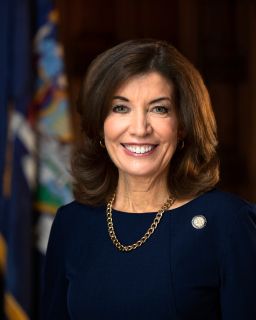Editor’s Note: Kathy Hochul is the Lieutenant Governor of New York. The views expressed here are her own. View more opinion on CNN.
Equal Pay Day marks the date in the calendar when women are finally able to catch up to what men earned the year before. It’s sad, but not surprising, that women in the US still earn far less than men, and the pandemic has only heightened the economic hardships for women.

The fact that this crisis began in March 2020, the month we traditionally celebrate Women’s History, is not lost on me. It’s a reminder that future historians will judge us on how women fared coming out of this once-in-a-century phenomenon. Will this be known as the year women fell into an abyss with no hope of climbing out? Or can women experience a “V” shaped recovery, falling fast and hard but rebounding higher than they were before?
My fear is that because of this pandemic, 2021 will go down in history as the time when American women fell further backward, instead of taking leaps forward.
Think this is an exaggeration? Just ask any woman how the coronavirus recovery is going for her.
Likely answer: “Not great.”
Now ask a woman of color how it’s going for her.
Likely answer: “What recovery?”
That sums up what women in America are experiencing.
When the Covid-19 tsunami hit us one year ago, the tidal wave swept over our most vulnerable. Now left in the wake are women of all ages struggling because for them, this pandemic has been a living hell.
To top it off, economists now predict that women face a generational setback, obliterating decades of long-fought economic gains. But does this have to be their fate? As someone who has dedicated my life to fighting for women, I simply refuse to accept this conclusion.
One year ago I wrote that women were already bearing the brunt of the crisis, both on the frontlines and in their pocketbooks. It’s now gone from bad to worse.
In December, women accounted for 100% of jobs lost in the US.
This past January, women’s labor force participation dropped to a 33-year low at 57%.
That same month, women accounted for nearly 80% of all workers over the age of 20 who left the workforce.
The burden of childcare, education, household maintenance and family caretaking unfairly falls on women. I have long held that “work/life balance” is a quaint, but perpetually elusive ideal. Now, even its pretense has been blown up.
Women of color continue to bear the highest burden. Their unemployment is higher. Many lost jobs in the hard-hit service and hospitality sectors. For those still employed, they shoulder much of the work on the pandemic frontlines, exposed to risk as they continue essential services and save lives.
The lack of quality, affordable childcare has long been a crisis, even pre-pandemic.
No one could have foreseen that working moms would have to balance their work Zoom meetings with their children’s Zoom classes.
The loss of childcare and in-person education is not only forcing women out of their jobs, it has the potential to keep women out of the workforce in the long term.
It’s encouraging to see the Biden administration bring this issue front and center, increasing childcare support for families and including more after-school, weekend and summer programs in the pandemic relief package that just passed.
And in New York, I’ve continued to advocate for additional support to expand access to childcare and make it more affordable for families. I also believe there isn’t a one-size-fits-all solution, and New York State is exploring ways to eliminate childcare deserts and to incentivize employers to provide better options.
That’s not just important for families. It’s also essential for the national recovery to get women back and expand the pool of good-paying careers available to them.
We must prioritize women’s economic empowerment and job training opportunities that lead to sustainable financial independence – now.
That means we need to continue investing in making job training more accessible. Sustainable careers for women are plentiful in fields like healthcare, clean and renewable energy, and technology. But more often than not, women need mentorship, encouragement and support to enter these fields.
In New York State, we are bringing together the public and private sectors, including Fortune 500 companies, to commit to creating more inclusive workforces and job training programs.
If other states follow New York’s lead, along with a higher federal minimum wage, more flexible work schedules, a national childcare policy, paid sick and family leave, online training for sustainable careers and a national recognition of the value of women’s work—it’s all possible.
My hope is that during next year’s Women’s History Month, we celebrate how women came back stronger, more resilient and more empowered than ever.
As the mother of a young woman, I’m not forsaking this generation of daughters, relegating them to be worse off than their mothers or grandmothers.
Are American women destined for a post-Covid generational setback?
No, not on our watch.



